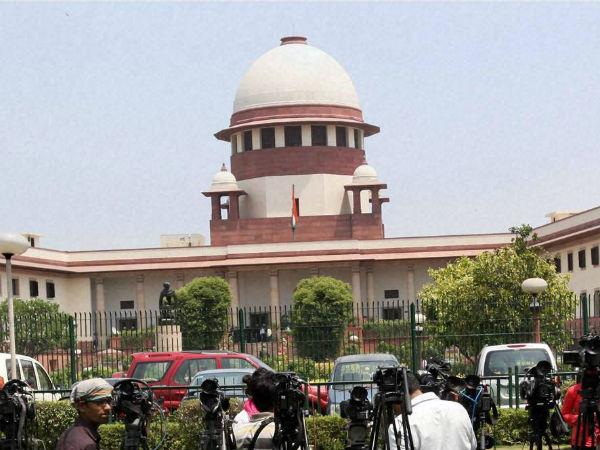Can Ayodhya dispute be solved through mediation: SC to decide today

The Supreme Court is likely to decide today whether the Ayodhya dispute can be solved through mediation.
A five-judge Constitution bench on February 26 had suggested an amicable resolution to the Ram Mandir case through mediation and said it would pass an order on March 6 with reference to the dispute.
The court will decide whether to send the Ayodhya dispute case to the court-appointed and monitored mediation or not on Wednesday. "We have suggested to the parties that during the interregnum a court-appointed and court-monitored mediation with utmost confidentiality could be initiated to bring a permanent solution to the issues raised in the cases," the bench had said on February 26.
On the last date of hearing while Muslim side and Nirmohi Akhada from the Hindu side in the case agreed for mediation, the counsels appearing for deity Ram Lalla Virajman, Akhil Bharat Hindu Mahasabha and Mahant Suresh Das were opposed to the mediation, saying court-appointed mediation had failed on earlier occasions. The five-judge Constitution Bench comprising Chief Justice of India Ranjan Gogoi, Justice SA Bobde, Justice DY Chandrachud, Justice Ashok Bhushan and Justice SA Nazeer had told the parties, "We're seriously giving a chance for mediation." "Even if there is only one per cent chance, it should be explored," Justice SA Bobde had added while emphasising for mediation in the matter.
The bench had recorded that apart from Nirmohi Akhada, Hindu sides in the case are not agreeable to mediation and said the court can invoke its power under Section 89 of Civil Procedure Code for alternate dispute mechanism. "We are considering a possibility of healing relationship," the bench had observed.
There are fourteen appeals pending before the top court against the 2010 Allahabad High Court judgment trifurcating the disputed site at Ayodhya for Ram Lalla, Nirmohi Akhara, and the original Muslim litigant. Apart from these appeals, there are several petitions pending before the court relating to the issue. The Centre government had filed a petition seeking modification of its 2003 order to allow it to return the "excess/superfluous land" or undisputed land out of the 67.703 acres acquired in Ayodhya to its original owners including the Ram Janmabhoomi Nyas, a trust formed by members of the Vishwa Hindu Parishad to oversee the construction of the Ram temple in Ayodhya.
The 0.313 acre plot, on which the disputed structure stood before it was demolished by 'Kar Sevaks' on December 6, 1992, was within the 2.77-acre disputed premises, the Central government had said, adding that it had then acquired 67.703 acre, including the 2.77-acre plot, through legislation in 1993. The Ram Janmabhoomi Nyas is the owner of as much as 42 acres of the acquired non-disputed land and Nyas now sought the return of excess land, said the Centre's plea. The Centre has claimed that only 0.313 acre of land was "disputed" on which the structure stood and sought permission to return to original owners the 67 acres "non-disputed" land around the disputed structure in Ayodhya. Another plea was filed by seven persons who claimed to be devotees of Lord Ram, challenging the constitutional validity of the 1993 law for acquisition of the land, including the Ayodhya disputed site. The petition was filed by residents of Lucknow, including two advocates, Shishir Chaturvedi, and Sanjay Mishra, who had challenged the Constitutional validity of 'The Acquisition of Certain Area at Ayodhya Act, 1993' on the ground that Parliament has no legislative competence to take over/acquire the property belonging to the State. State Legislature has exclusive power to make provision relating to the management of the affairs of religious institutions working in the State, the petition had added.
The petition had said that the 1993 Act infringes upon the right to religion of Hindus guaranteed and protected under Article 25 (freedom of conscience and free profession, practice and propagation of religion) of the Constitution. The petition had also sought direction "to restrain the Central government and the Uttar Pradesh government from interfering in Puja, Darshan and performance of rituals at the places of worship situated within the land admeasuring 67.703 acres acquired by the Act particularly at the land belonging to Shri Ram Janmbhoomi Nyas, Manas Bhavan, Sankat Mochan Mandir, Ram Janmasthan Temple, Janki Mahal and Katha Mandap." BJP leader Subramanian Swamy also moved the court seeking enforcement of his fundamental right to worship at the disputed site in Ayodhya. In September last year, a three-judge bench, headed by former Chief Justice Deepak Misra CJI had ruled that the court would hear the issue purely as a "land dispute."
